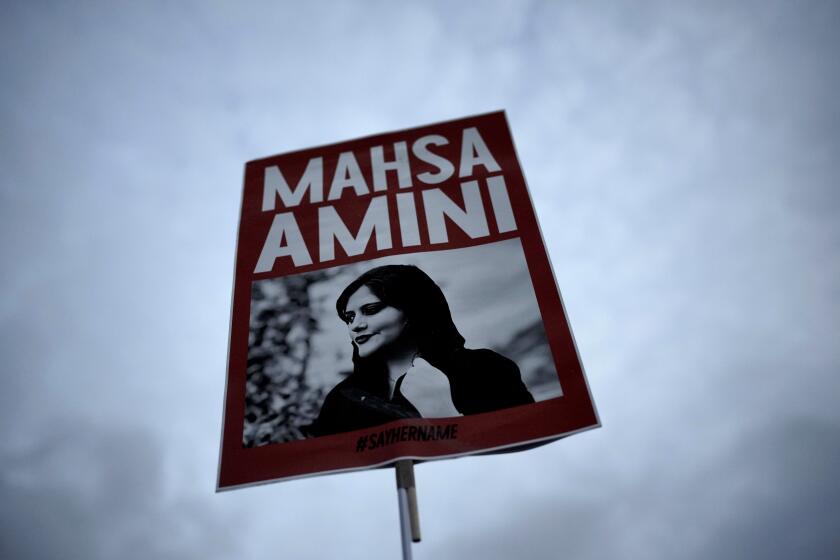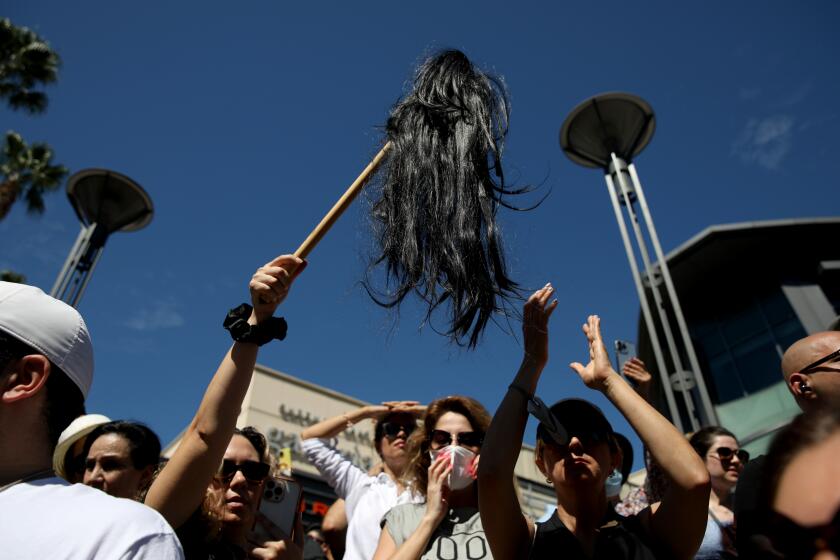Iranian rapper who came to fame during 2022 protests sentenced to death, lawyer says

- Share via
JERUSALEM — A rapper in Iran who came to fame over his lyrics about the 2022 death of Mahsa Amini and criticism of the Islamic Republic has been sentenced to death, his lawyer and rights activists said Thursday.
Confusion still surrounds the sentence issued against 33-year-old metal shop worker Toomaj Salehi, as even the state-run Islamic Republic News Agency, or IRNA, and Iran’s judiciary did not formally confirm it. But the news quickly drew international criticism from the U.S. and United Nations, which pointed to it as a sign of Tehran’s continuing crackdown against all dissent after years of mass protests in the country.
“Art must be allowed to criticize, to provoke, to push the boundaries in any society,” a panel of the U.N.’s independent experts on Iran said in a statement Thursday.
Word spread Wednesday after a report by Iran’s pro-reform Shargh newspaper said Salehi had been given a death sentence by a Revolutionary Court in Isfahan, a central Iranian city recently targeted by an apparent Israeli attack. Revolutionary Courts in Iran often involve closed-door hearings, secret evidence and few rights for those on trial.
An Iranian singer who won a Grammy presented by First Lady Jill Biden has been sentenced to more than three years in prison over his anthem supporting the 2022 protests over the death of Mahsa Amini.
Salehi’s lawyer, Amir Raisian, told the Associated Press on Thursday that he had received notice of the death sentence against his client. Raisian said he planned to file an appeal.
Salehi’s case stems from Amini’s death in 2022 after her arrest by police for not wearing a hijab to their liking. United Nations investigators say that Iran was responsible for Amini’s death, and that it violently put down largely peaceful protests in a months-long security crackdown that killed more than 500 people and saw over 22,000 detained.
Salehi rapped about Amini in one video, saying: “Someone’s crime was dancing with her hair in the wind.”
In another verse, he predicted the downfall of Iran’s theocracy. “Your whole past is dark, the government that took the light out of the eyes. ... We go from the bottom of the pyramid and knock to the top. ... Forty-four years of your government, this is the year of failure.”
A court in Iran has sentenced two female journalists to up to seven years in prison for collaborating with the U.S. government and other charges.
His other songs vulgarly criticized the all-volunteer Basij wing of Iran’s paramilitary Revolutionary Guard, as well as referencing Supreme Leader Ayatollah Ali Khamenei.
Salehi initially received a six-year prison sentence but was released after Iran’s Supreme Court sent the case back to the lower court over flaws in his original sentencing.
Out on bail, he was arrested again in November after saying in a video message that he was tortured after his October 2022 arrest. State media at the time released a video showing him blindfolded and apologizing for his words, a statement probably made under duress.
Iran’s judiciary did not acknowledge the death sentence, while IRNA referred to “reports” he received it.
To have a death sentence issued on a reversal of a lesser sentence is highly unusual in Iran, possibly signifying just how serious Iran’s theocracy had taken Salehi’s remarks.
It also comes as other journalists, activists and musicians have been targeted since the demonstrations over Amini. An Iranian singer who won a Grammy presented by U.S. First Lady Jill Biden was sentenced to more than three years in prison over his anthem supporting the 2022 protests.
From Tehran to Los Angeles, the act of cutting hair has become a form of resistance.
Activists immediately criticized Salehi’s sentence.
“This grotesque manipulation of the judicial process aims to silence dissent,” Hadi Ghaemi of the New York-based Center for Human Rights in Iran said. “Toomaj’s imprisonment stems from his vocal advocacy against state oppression. It is imperative that supporters of free speech and dissent unite to demand his immediate release.”
The sentencing also drew criticism from Washington.
“This is just another example of the Iranian regime’s horrific and pervasive human rights abuses,” State Department spokesperson Vedant Patel said Wednesday. “We once again condemn the Iranian regime’s ... use of the death sentence as a tool to suppress people’s human rights and fundamental freedoms.”
Gambrell writes for the Associated Press.
More to Read
Sign up for Essential California
The most important California stories and recommendations in your inbox every morning.
You may occasionally receive promotional content from the Los Angeles Times.
















